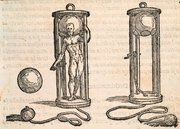Homunculus
From Plastic Tub
(Difference between revisions)
| Revision as of 23:16, 22 Dec 2005 Payne (Talk | contribs) tb'd ← Go to previous diff |
Current revision Payne (Talk | contribs) pipes |
||
| Line 21: | Line 21: | ||
| </td> | </td> | ||
| <td width="180px" align="left" valign="top" bgcolor="#CCCCCC" style="margin: 0 0 1em 1em; background: #E0E0E0; border: 1px #aaa solid; border-collapse: collapse; font-size: 100%;"> | <td width="180px" align="left" valign="top" bgcolor="#CCCCCC" style="margin: 0 0 1em 1em; background: #E0E0E0; border: 1px #aaa solid; border-collapse: collapse; font-size: 100%;"> | ||
| - | [[Image:Humunculus.jpg|thumb|center|The first homunculus was created by alchemist Paracelsus. It promptly escaped.]] | + | [[Image:Humunculus.jpg|thumb|center|The first homunculus was created by alchemist [[Paracelsus]]. It promptly escaped.]] |
| == Desiderata == | == Desiderata == | ||
Current revision
homunculus n. 1. A controlling agent or meme, often diminutive in size or concept; the seed of a watermelon. 2. trad. A miniature human being residing in a sperm cell, which, when properly introduced to an egg, will develop into a full-sized person, a tiny golem, or an unseen master inhabiting a human host. 3. A profane creation which thwarts its intended purpose; an unwelcome visitor. 4. The bane of a poob.
Usage"Depite Skinner's claims to have deloused mankind, homunculi fling Payne like a rag doll." -- A Snoutless Setter: Payne Has No Point, Nick Hook, ed., The Whittier Globe, Dec. 3, 1994. See Also |
 The first homunculus was created by alchemist Paracelsus. It promptly escaped. DesiderataWilliam Godwin (http://en.wikipedia.org/wiki/William_Godwin), Mary Shelly's father, was an avid collector of homunculi.
|
